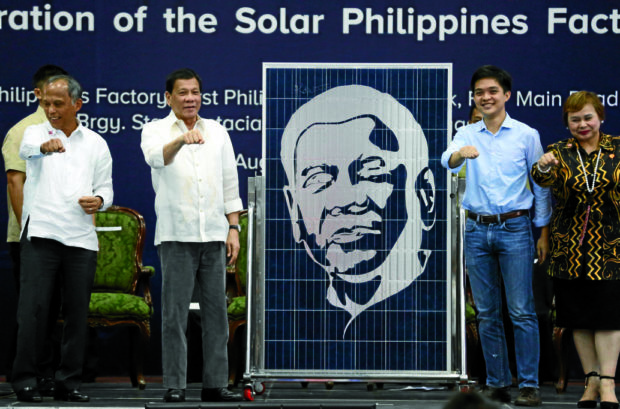
CUSTOMIZED PANEL President Rodrigo Duterte receives a token of a customized solar panel with his image during the inauguration of Solar Philippines’ factory in Batangas province. With him are
Energy Secretary Alfonso Cusi, Solar Philippines president Leandro Leviste (second from right), and Charito Plaza. INQUIRER FILE PHOTO/JOAN BONDOC
MANILA, Philippines — President Rodrigo Duterte has signed the franchise for the operation of Solar Para sa Bayan Corporation (SPB), a renewable energy distribution firm owned by 25-year-old Leandro Leviste, son of former senator and now Antique Rep. Loren Legarda.
Duterte signed Republic Act 11357 titled “An Act Granting Solar Para sa Bayan Corporation a Franchise, etc.” on July 31, Secretary Adelino Sitoy of the Presidential Adviser on Legislative Affairs confirmed in a text message.
Based on its website, SPB “is a Filipino social enterprise which aims to serve Filipino communities with cheap, clean, reliable 24/7 electricity.”
Based on RA 11357, SPB was granted “a nonexclusive franchise to construct, install, establish, operate and maintain” solar-powered facilities to provide renewable energy to areas without electricity or underserved nationwide.
To recall, several business groups have earlier asked Duterte to review the franchise of the solar company, citing its impact on small, mini, and microgrids in the country.
READ: Business groups ask Duterte to review Solar Para sa Bayan bill
The groups composed of the American Chamber of Commerce of the Philippines (AMCHAM), the Financial Executives Institute of the Philippines (FINEX), the Makati Business Club (MBC), the Management Association of the Philippines (MAP), the Semiconductor and Electronics Industries in the Philippines, Inc. (SEIPI), and the Women’s Business Council Philippines (WBCP) said a franchise for Leviste’s company “will create an undue competitive edge in favor of SPB Corporation and put at a disadvantage other renewable energy companies now operating in our country.”
Also in an earlier statement, Leviste said, “(W)e hope this will not only benefit these towns, but create healthy competition that benefits consumers across the country.”
READ: Solar firm wants to end ‘complacency’ among electric co-ops
According to the new law, “a special right is hereby reserved to the President of the Philippines in times of war, rebellion, public peril, calamity, emergency, disaster or disturbance of peace and order to temporarily take over and operate the facilities of the grantee or to authorize the temporary use and operation thereof by any agency of the government, upon due compensation to the grantee, for the use of the said facilities during the period when these shall be so operated.”
The law also said that “the retail rate charged by the grantee to the end users shall be the true cost and shall not be entitled to any government subsidy.”
“Such retail rate shall be regulated by and subject to the approval of the ERC (Energy Regulatory Commission). The retail rates charges by the grantee to the end users shall be made public and transparent,” it added. /kga